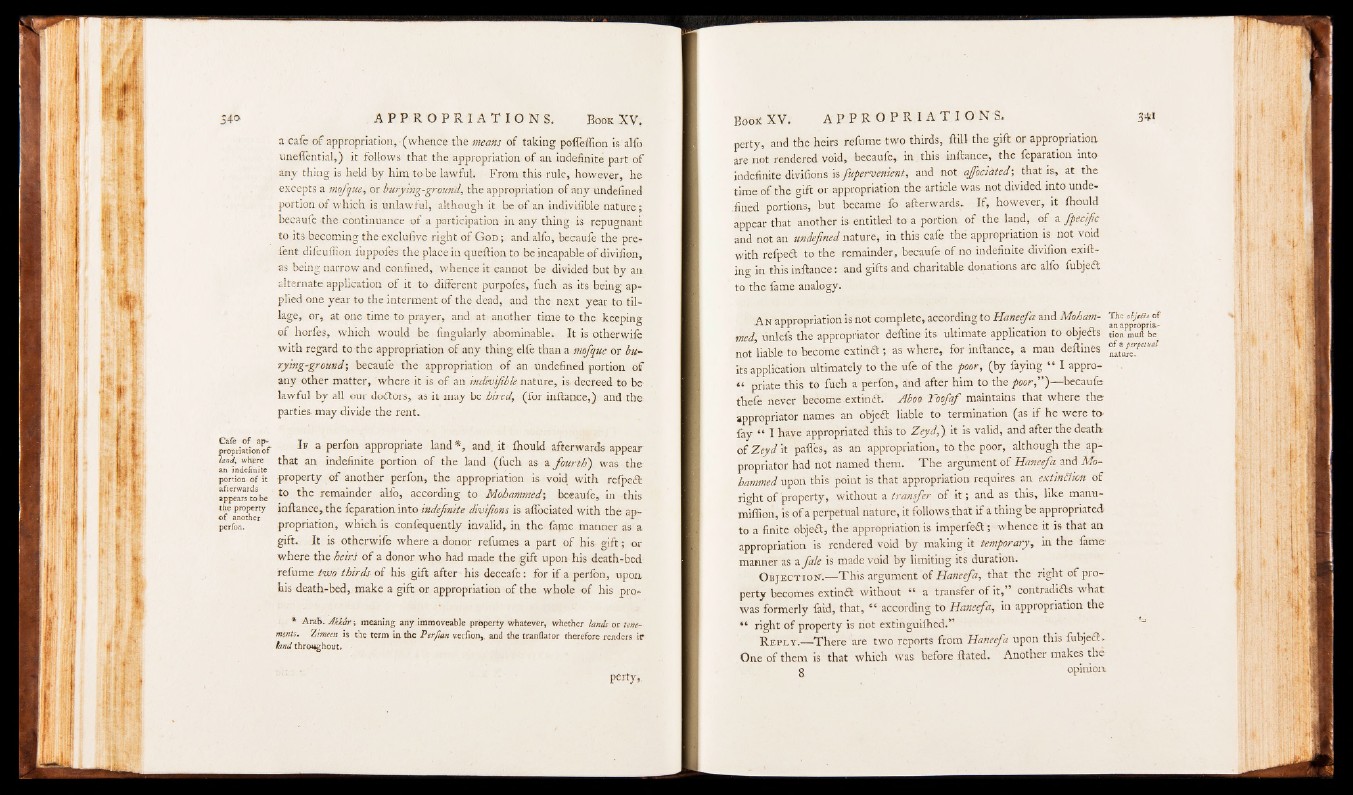
Cafe o f appropriation
o f
land, where
an indefinite
portion of it
afterwards
appears to be
the property
©f another
perfon.
a cafe of appropriation, (whence the means of taking poffeffion is alfo
uneffential,) it follows that the appropriation of an indefinite part of
any thing is held by him to be lawful. From this rule, however, he
excepts a mofque, or burying-ground, the appropriation of any undefined
portion of which is unlawful, although it be of an indivifible nature;
becaufe the continuance of a participation in any thing is repugnant
to its becoming the exclufive right of G o d ; and alfo, becaufe the pre-
fen-t difcuflion luppofes the place in queftion to be incapable of divifion,
as being narrow and confined, whence it cannot be divided but by an
alternate application of it to different purpofes, fuch as its being applied
one year to the interment of the dead, and the next year to tillage,
or,, at one time to prayer, and at another time to the keeping
of horfes, which would be Angularly abominable. It is ptherwife
with regard to the appropriation of any thing elfe than a mofque or burying
ground-, becaufe the appropriation of an undefined portion of
any other matter, where it is of an indivifible nature, is decreed to be
lawful by all our doCtors, as it may be hired, (for inftance,) and the
parties, may divide the rent.
If a perfon appropriate land*, and. it fhould afterwards appear
that an indefinite portion of the land (fuch as a fourth) was the
property of another perfon, the appropriation is void, with refpedt
to the remainder alfo, according to Mohammed-, beeaufe, in this
inftance, the feparationinto indefinite divifions is affociated with the appropriation,
which is confequently invalid, in the fame manner as a
gift. It is otherwife where a donor refumes a part of his gift; or
where the heirs of a donor who had made the gift upon his death-bed
refume two thirds of his gift after his deceafe: for i f a perfon, upon,
his death-bed, make a gift or appropriation of the whole of his pro-
* Arab. M la r ; meaning any immoveable property whatever, whether lands or tenements.
Zim een is the term in the P tr fia n verfion,, and the tranflator therefore renders ic
lan d throughout. ■
petty,
perty, and the heirs refume two thirds, ftill the gift or appropriation
are not rendered void, becaufe, in this inftance, the feparation into
indefinite divifions is fupervenient, and not ajfocidted-, that is, at the
time of the gift or appropriation the article was not divided into undefined
portions, but became fo afterwards,. If, however, it fhould
appear that another is entitled to a portion of the land, of a fpecifie
and not an undefined nature, in this cafe the appropriation is not void
with refpeft to the remainder, becaufe of no indefinite divifion exift-
ing in this inftance: and gifts and charitable donations are alfo fubjeft
to the fame analogy.
A n appropriation is not complete, according to Haneefa and Mohammed,
unlefs the appropriator deftine its ultimate application to objedts
not liable to become extindt; as where, for inftance, a man deftines
its application ultimately to the ufe of the poor, (by faying “ I appro-
“ priate this, to fuch a perfon, and after him to the poor,” )— becaufe
thefe never become ex1111 cl. ylb00 TToofef maintains that where the
appropriator names an objeft liable to termination (as if he were to-
fay “ I have appropriated this to Zeyd,) it is valid, and after the death
of Zeyd it pafles, as an appropriation, to the poor, although the appropriator
had not named them. The argument of Haneefa and Mohammed
upon this point is that appropriation requires an extinhiwn of
right of property, without a transfer of i t ; and as this, like manu-
miflion, is of a perpetual nature, it follow sthat if a thing be appropriated
to a finite objedt, the appropriation is imperfect; whence it is that an
appropriation is rendered void by making it temporary, in the fame-
manner as a fale is made void by limiting its duration.
O b j e c t i o n .— This argument of Haneefa, that the right of property
becomes extindt without “ a transfer of it,” contradicts what
was formerly faid, that, “ according to Haneefa, in appropriation the
“ right of property is hot extinguifhed.”
R e p l y .— There are two reports from Haneefa upon this fiibjedt.
One of them is that which was before ftated. Another makes the
o , opinion
The o lje fls o f
an appropriation
mull be
o f a perpetual
nature.